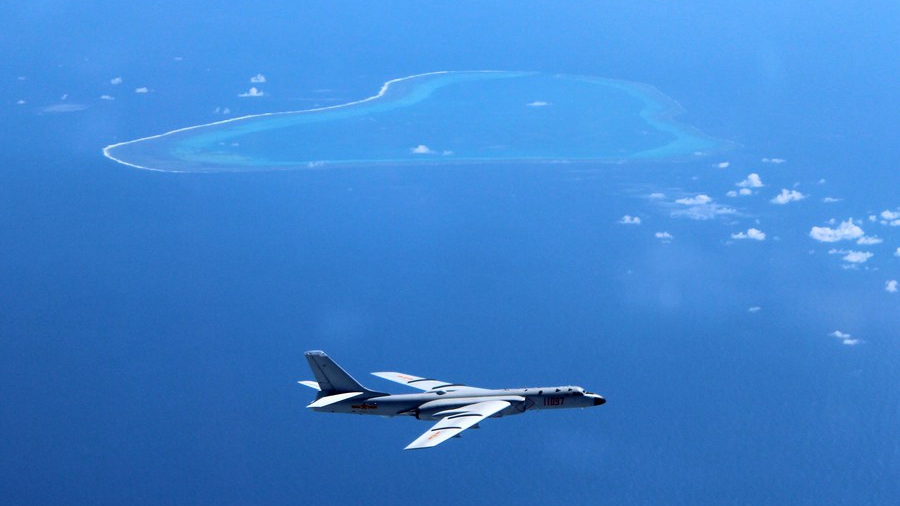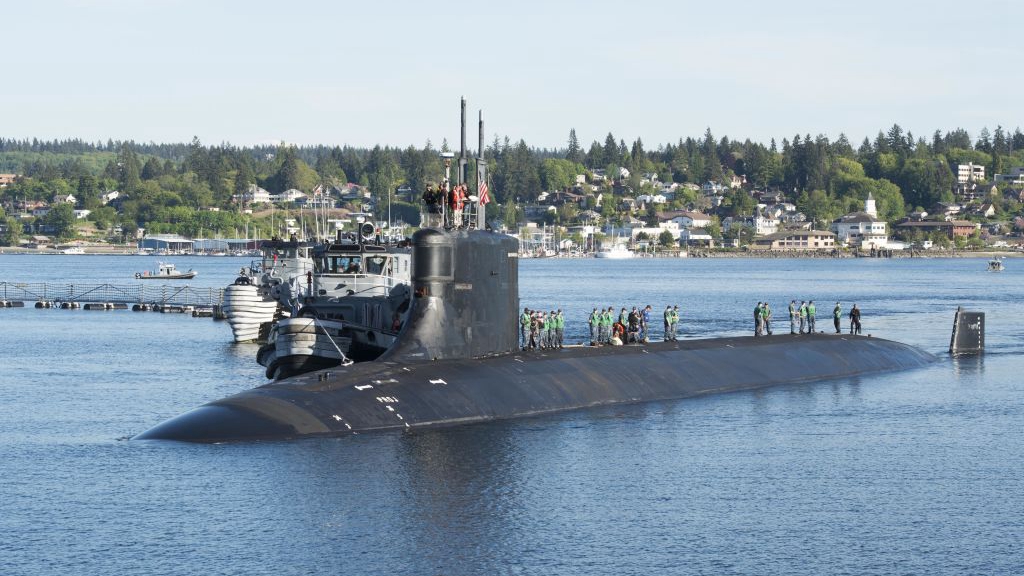
A Chinese H-6K bomber patrolling islands and reefs in the South China Sea. /Xinhua
A Chinese H-6K bomber patrolling islands and reefs in the South China Sea. /Xinhua
Editor's note: Xin Ping is a commentator on international affairs who writes regularly for CGTN, Global Times and China Daily. The article reflects the author's opinions and not necessarily the views of CGTN.
The northeast monsoon has blown away the summer clouds above South China Sea, giving it a high clear sky and pure, transparent water. Yet, deep under the tranquil surface, there is treacherous turbulence, caused by natural or human activities, with the man-made ones being more dangerous and troublesome.
One month ago, the USS Connecticut, a Seawolf-class nuclear-powered submarine of the U.S. Navy, collided with an "unknown object" in the South China Sea. The submarine's sneaking away by stealth, the much-delayed announcement of the accident, and the ambiguous statement by the U.S. military altogether have left the world with too many queries: what on earth happened in the collision; was there any nuclear leak caused by the collision; was there any environmental consequences or hidden impact; and more importantly, why did the U.S. naval vessel take such a long journey to South China Sea and bring so big a trouble in the first place?
A collided nuclear submarine has all the possibilities to cause nuclear leakage. The U.S. Navy has reported a dozen more staff injured, which indicates that this could hardly be a slight hit but one with violent impact.
Even if the nuclear reactor was not damaged, as the latest U.S. Navy announcement purported, a possible broken pipeline might also trigger a leaking. Leakage of weapon-grade nuclear material contained in the Connecticut would do more harm to the ocean environment and the adjacent land thousands of times more than the contaminated water to be discharged from the Fukushima Daiichi Power Station.
The fishery industry of countries around the South China Sea would be severely affected. The right to health and right to life of the people living in this region would be under severe threat.
When the U.S. warships cruise rampantly all across the South China Sea in the name of Freedom of Navigation, the U.S. should respect the right of littoral countries and their people, and disclose the result of its investigation into the accident in a thorough and transparent way.
The Connecticut collision is just an early warning against the danger of existence of any nuclear equipment within the South-East Asian nuclear-free zone. To protect the ASEAN countries and its people from any harm caused by nuclear weapons, the ASEAN member-states concluded in 1995 the Treaty of Southeast Asia Nuclear Weapon-Free Zone, also known as the Bangkok Treaty, obliging its members not to develop, manufacture or otherwise acquire, possess or have control over nuclear weapons. While the ASEAN countries are strictly observing the Treaty, the nuclear-weapon states ought to respect, not violate it.

Submariners standing on top of the Seawolf-class fast-attack submarine USS Connecticut in the water at Naval Base Kitsap-Bremerton, Washington, May 7, 2018. /Getty
Submariners standing on top of the Seawolf-class fast-attack submarine USS Connecticut in the water at Naval Base Kitsap-Bremerton, Washington, May 7, 2018. /Getty
However, the signing of a new trilateral defense technology-sharing pact among the U.S., the UK and Australia, known as AUKUS, will put the Southeast Asia under nuclear hazard. According to the pact, the U.S. and the UK will help Australia acquire nuclear-powered submarines. This would allow the latter, as a non-nuclear weapon state, to obtain high-enriched uranium which could be used directly in the manufacture of nuclear weapons.
This is too obvious an act of nuclear proliferation, totally against the spirit of Treaty on the Non-Proliferation of Nuclear Weapons. The building of more nuclear-equipped warships and their future deployment near or in South China Sea would no doubt jeopardize this region with potential and realistic nuclear damage scenarios. How many more "Connecticut Collisions" would be expected to come to pass?
It is a stock-in-trade of the U.S. government to cite the international treaties and obligations to contain and even sanction countries it doesn't like, and to trample on the international law when it or its allies commit misdeeds. But the world cannot take this for granted, especially when it is a matter of life or death like the proliferation of nuclear materials.
The legitimate rights of the people around the South China Sea shall not be sacrificed for the deepening of defense cooperation between the U.S. and its allies, nor shall they be traded into the pocket money of the U.S. Military-Industrial Complex. To play with nuke in the South China Sea will only lead to catastrophes. No countries should stand idly by with folded arms.
(If you want to contribute and have specific expertise, please contact us at opinions@cgtn.com.)

